Our Beliefs
We are a Christian congregation who believes that the Bible is the sole rule and norm by which all teaching and doctrine is to be judged. As a Lutheran congregation, we hold that the reforms of the Church during the 16th Century were necessary and brought the Church back into line with what Scripture teaches. For that reason, we subscribe unconditionally to the unaltered Augsburg Confession (1530) and the rest of the documents contained within the Book of Concord (1580), the confessions of the Lutheran Church. For more information on our specific beliefs and doctrinal commitments, please see below.
Christianity and the Church
Christianity is the faith taught by Holy Scripture that Jesus Christ is the Son of God, the second member of the Trinity, and is the sole savior of the world. Besides Jesus Christ, “there is no other name on earth given by men by which we can be saved” (Acts 4:12). He is “the Way, the Truth, and the Life” (John 14:6) through which we come to know God, our Father, and have a right to stand before God as forgiven sinners, as saints.
Jesus came to fulfill what was prophesied of him in the prophetic Scriptures of the Old Testament. This he did by assuming our humanity, taking on human flesh, being born in the likeness of men, and then by suffering and dying for the sins of the world. As confirmation that his work and sacrifice was accepted by God, the Father raised him from the dead for our justification.
We believe that when Jesus came to redeem sinful man, he also intended to found the Church. As Jesus himself says, “Upon this rock, I will build my Church” (Matthew 16:18). In order to establish the Church, Christ sent out the Apostles as witnesses of his teaching, death, and resurrection. He instructed them to preach, to teach, to baptize, to forgive sins, and to keep the Lord’s Supper. The members of the Church “devoted themselves to the apostles’ teaching (Holy Scripture and Preaching), to the fellowship of the breaking of the bread (the Lord’s Supper), and to the prayers” (Acts 2:42). Our congregation observes these things, looking forward to the day when Christ returns to raise the dead and to render judgement upon mankind.
We believe that the Church is to be found where the gospel is preached rightly and the Sacraments are rightly administered. This means that the Church is found where pastors and congregations remain faithful to God’s Word and gather together around those things which Christ has entrusted to the Church. This also means that while the world may change over the years, the Church’s job is not to change, but rather to remain faithful to what she has been given by the Lord. Its message therefore also stays the same, “The kingdom of God is at hand. Therefore, repent and believe the Gospel” (Mark 1:15).
More information about what our congregation believes about the Church may be found at the following links:
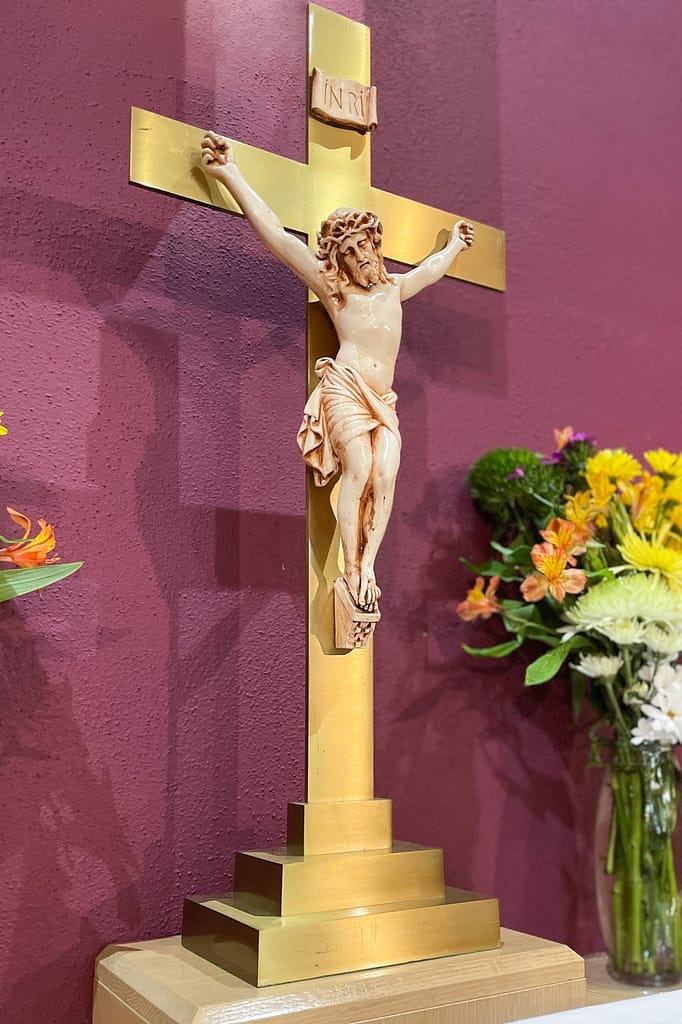
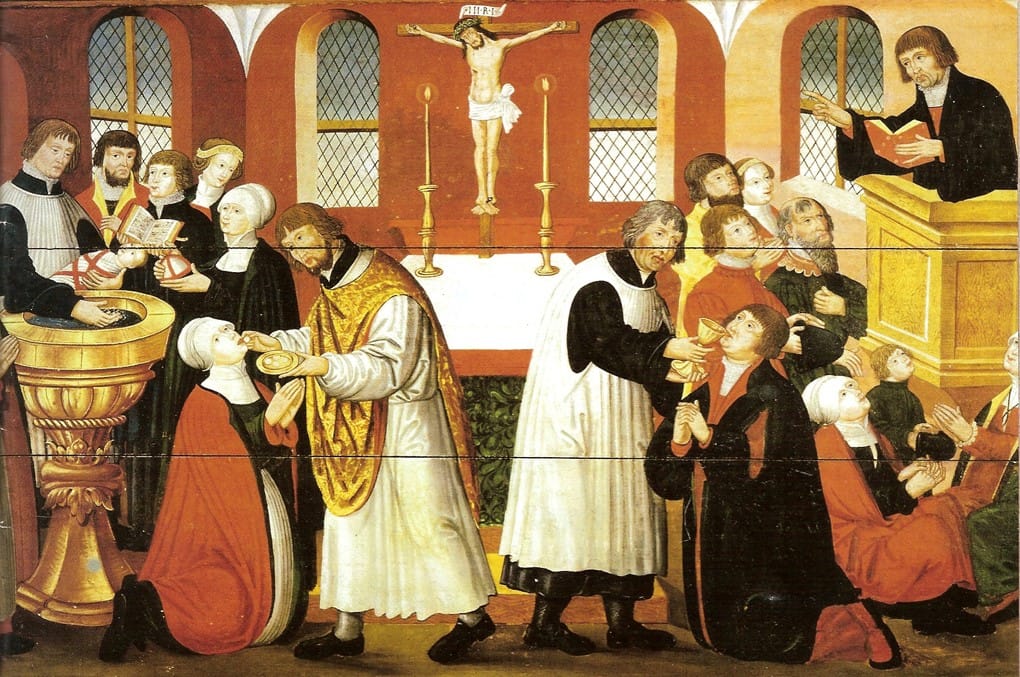

Holy Scripture (the Bible) and Our Confessions
At the beginning of the Reformation, Martin Luther was concerned that the people were not hearing or reading the Bible in their own language and as a result were being misled. Therefore, he sought to translate the Bible and put it into the language of the German people.
Our congregation shares this same concern for the Bible. We believe that the entire Bible from beginning to end is the inspired, inerrant Word of God. As St. Paul writes, “All Scripture is God-breathed” (2 Timothy 3:16). Because Scripture is God-breathed, it is therefore what the Church and her members are bound to for all of time. Therefore, our entire Divine Service is filled with God’s Word, both from the Old and New Testaments.
More information about what our congregation believes about Scripture may be found at the following links:
God’s Will for Our Lives
What does God want for us? “Repent and believe the Gospel” (Mark 1:15). Why? Because God “desires all men to be saved and to come to the knowledge of the truth” (1 Timothy 2:4). God takes “no pleasure in the death of the sinner, but rather that the sinner turn from his way and live” (Ezekiel 33:11), he does “not want that any should perish, but that all should reach repentance” (2 Peter 3:9).
God’s will for our lives can be briefly summarized in the Ten Commandments, otherwise known as the Law. However, as sinful fallible human beings we fall short of God’s will for our lives. God threatens to punish all those who break his commandments, but promises to show mercy to those who love him and keep his commandments (Exodus 20:5–6).
Yet, Holy Scripture clearly teaches, “that there is no one good, not even one” (Romans 3:10). As a result, no one can become righteous in God’s sight through obeying God or offering to him good deeds (Romans 3:20). “All have sinned and fallen short of the glory of God” (Romans 3:24). However, there is good news.

The Good News of the Gospel of Jesus Christ
Although “all have sinned and fallen short of the glory of God” (Romans 3:24), God has graciously provided a way for us to be righteous, or innocent, in his sight. For although “no one is justified before God by the law” (Galatians 3:11), those who repent and turn to God for forgiveness in Christ Jesus are justified (declared righteous or innocent) by faith (Galatians 2:16, 3:11).
As a result, our Church teaches that “men cannot be justified by their own strength, merits, or works, but are freely justified for Christ’s sake, through faith, when they believe that they are received into God’s favor, and that their sins are forgiven for Christ’s sake, who, by His death, has made satisfaction (payment) for our sins” (Augsburg Confession Article IV). This is the great mystery of our faith: God gave Jesus Christ who knew no sin to take on our sin so that we might become righteous in God’s sight (2 Corinthians 5:21).
More information about what our congregation teaches about salvation and the Gospel may be found at the following links:
- Augsburg Confession (1530) Article III: Concerning the Son of God (Jesus Christ)
- Ausgburg Confession (1530) Article IV: Concerning Justification
- Smalcald Articles (1537) Part 2, Article I: The First and Chief Article
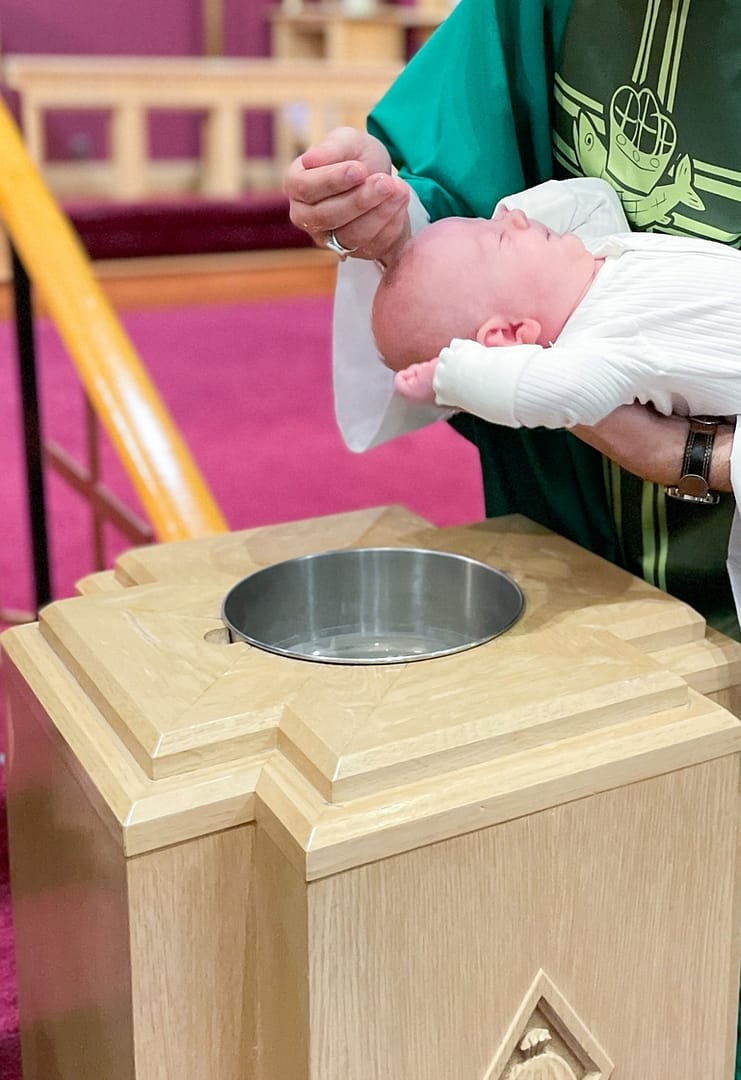
The Sacrament of Holy Baptism
The forgiveness which Christ won for all mankind on the cross must be distributed and received by people. In order to this, Jesus instituted what we call “means of grace.” This simply means that God has made various ways for us to receive his forgiveness. For most people, this happens first in Holy Baptism.
Our congregation believes that when our Lord Jesus Christ instituted the practice of Holy Baptism he gave it to the Church for the purpose of “making disciples of all nations” (Matthew 28:18–20).
On Pentecost day, we see the apostles carrying out what this means for the life of the Church. St. Peter proclaims, “Repent and be baptized every one of you in the name of Jesus Christ for the forgiveness of sins, and you will receive the gift of the Holy Spirit. For this promise is for you and for your children and for all who are far off, everyone whom the Lord our God calls to himself” (Acts 2:38–39).
Therefore, our Church believes that in Holy Baptism God offers his grace to poor miserable sinners dead in their sins, works forgiveness of sins, grants the Holy Spirit, and adopts the baptized as his own dearly-beloved child.
Since Jesus tells us that baptism is for “all nations” and because St. Peter explicitly says that this promise is “for you and for your children,” our congregation practices the historical practice of infant baptism. We believe that when infants and little children are baptized, God supplies the faith needed for baptism through His Word and applies the promise of his salvation to them.
For more information, see the following:
Confession and Absolution
In Holy Baptism, when we became Christians, all of our sins were forgiven for the sake of Christ. However, even though we have come to faith we still sin daily. As a result, our lives as Christians are like a marathon of daily repentance. That we might be strengthened in our faith and be assured of the forgiveness of sins, Jesus also gave to the Church the authority to forgive sins and to withhold forgiveness from those who do not want to repent: “As the Father has sent me, even so I am sending you. . . if you forgive the sins of any, they are forgiven them; if you withhold forgiveness from any, it is withheld” (John 20:23).
Because of the great comfort that absolution brings to troubled consciences, our congregation retains the historic practice of confession and absolution, both public and private. Our Sunday Divine Services begin with the rite of Confession and Absolution where we confess our sins and our pastor absolves us in Christ’s stead, according to his commandment (John 20:23). In addition, if an individual member desires private confession, our Church also retains that practice for the sake troubled consciences and pastoral care.
More information about repentance, as well as Confession and Absolution may be found here:
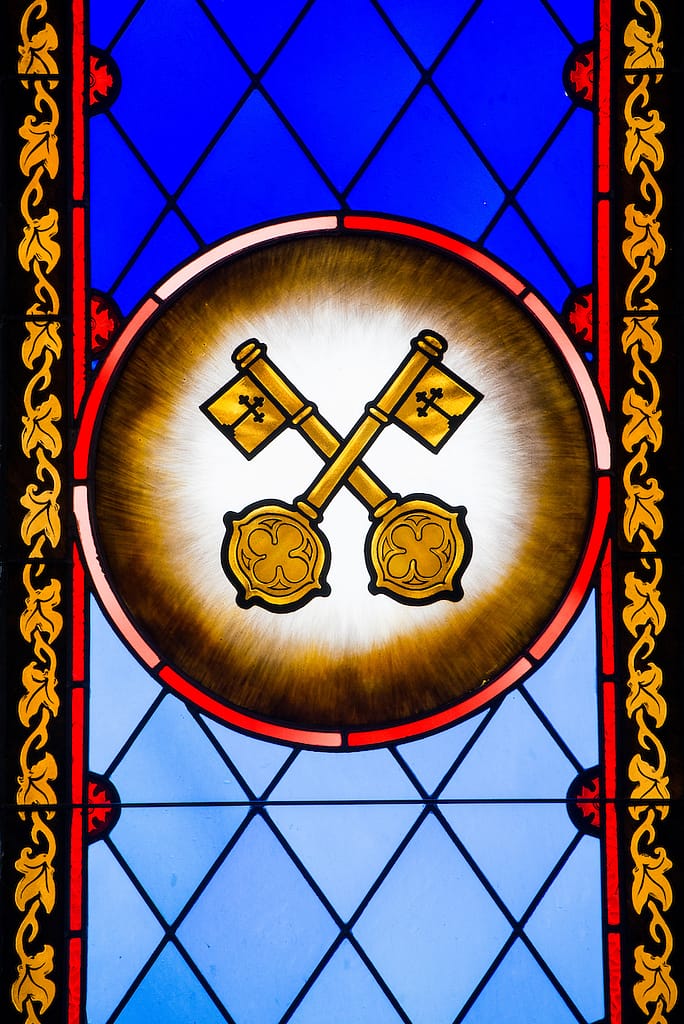
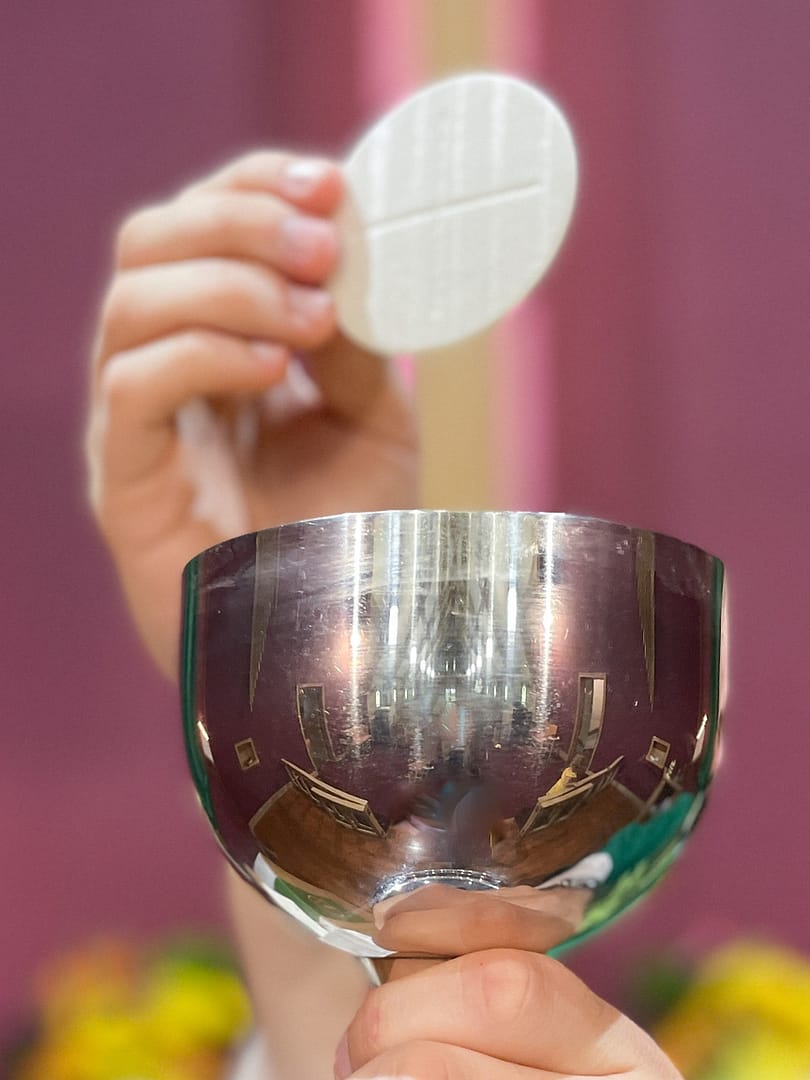
The Sacrament of the Lord’s Supper
The forgiveness which Christ has one on the cross also comes to us in one other way: the Lord’s Supper.
Our Lord Jesus Christ, on the night when he was betrayed, took bread, broke it, and when he had given thanks, he gave it to his disciples and said, “Take, eat, this is my body, which is given for you. Do this in remembrance of me.” In the same way also, he took the cup after supper, and when he had give thanks, he said, “Drink of it all of you. This cup is the New Testament in my blood which is shed for you for the forgiveness of sins. Do this in remembrance of me.” (Matthew 26:26–28; Mark 14:22–24; Luke 22:19–20; 1 Corinthians 11:23–26)
According to these words, our congregation believes that Christ gives his body and blood as true food and true drink at the Lord’s Supper, both to the worthy and unworthy.
More information about our congregation’s understanding of the Lord’s Supper may be found here:
- Augsburg Confession (1530) Article X: Concerning the Lord’s Supper
- Luther’s Small Catechism (1529) Part VI: The Sacrament of the Altar
Because of our beliefs concerning the Lord’s Supper and the need for pastoral care, our congregation practices closed communion. Our communion statement is available here along with our service times.